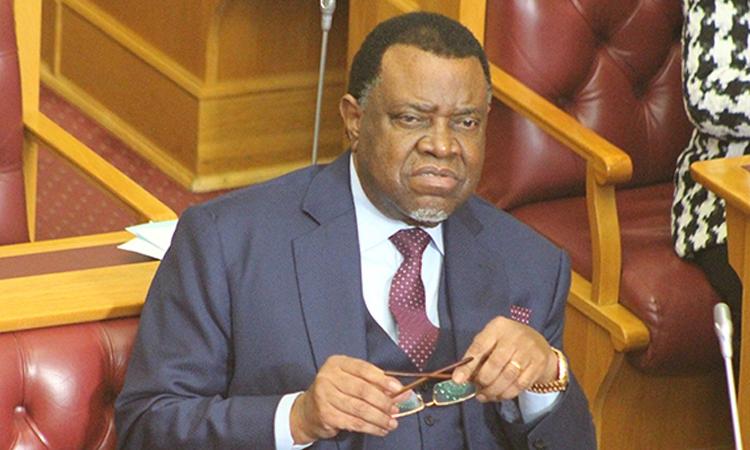Africa-Press – Namibia. PRESIDENT Hage Geingob said the government plans to create close to 3 000 new jobs in the police, prisons and Namibian Defence Force (NDF) to address youth unemployment – warning that young people could turn to terrorism if they are not employed.
He made these comments yesterday in parliament during his state of the nation (Sona) address, in which he promised new government jobs just two weeks after pushing for a reduction in the number of civil service employees.
Geingob made a U-turn on his earlier call to the Public Service Commission (PSC) to cut the wage bill, saying yesterday that his administration would be adding thousands of positions to the government’s payroll.
There are currently 107 000 civil servants.
During his Sona, Geingob raised alarm bells over the country’s unemployment rate, especially among the youth, which is said to be hovering around 50%.
“If you declare a state of emergency, it must be a very, very serious matter. The unemployment of the youth is a serious crisis.
“Youth, if they are all going to rise up, it will be a crisis. We count the youth from 14 to 20 [years old]. They can get guns somewhere. We are talking about terrorism. They are available. There is a danger. That’s true,” Geingob said.
He was responding to questions from opposition leaders in the National Assembly about his plan to address the ticking time bomb of youth unemployment.
“I am worried about declaring a state of emergency, but I agree with you. It is a serious problem. We can do other things and start to create jobs for them in a hurried manner to eliminate the danger,” Geingob said.
“To respond to the challenge of unemployment, the Namibia Correctional Services has commenced the process of recruiting 300 new intakes, while the Namibian Police will recruit an additional 1 000 intakes in 2023, which will significantly relieve the human resource constraints being experienced in the police force,” he said.
“The NDF has recruited 1 470 intakes during 2022, and has made provision to recruit an additional 1 500 new intakes for 2023.”
An amount of N$200 million will be allocated to the education ministry for the recruitment of teachers, as thousands of young graduates apply to just a few general positions at entities across the country.
Geingob said this crisis was created by the country’s successful education system.
“We focused on education because we said we are left out. We really succeeded in accessing it. That success created now problems of space and equality. But it is true when you talk about child-based education, so that not only the final examination counts,” Geingob said.
On the national education system, Geingob said the poor learning and teaching outcomes with high failure rates are most concerning to the government.
“High failure rates lead to high repetition rates and a significant cost burden to the government, while undermining overall societal progression,” he said.
Out of 38 019 full-time candidates who sat for the Grade 12 examinations, only 5 812 candidates scored 25 points and above to qualify for entry to tertiary institutions.
These statistics, Geingob said, puts more pressure on the social grants, making them unsustainable.
About two weeks ago, Geingob advised the PSC to consider cutting the number of government employees by half to ensure those that remain receive good salaries.
Geingob said this when he met with members of the PSC at State House.
“Say on top of what you are getting, there are others that are getting zero, the size of the public service must be looked at, maybe to say cut it in half so that those who remain can be given proper salaries,” Geingob said at the time.
He said some people were employed politically and were added to those already employed.
“So, it’s a big public service maybe falling on another. So, PSC, look into that. We are serious. it’s your duty,” the president said.
GRANTS NOT SUSTAINABLE
Geingob said yesterday more than 30% of the total population receives a government grant in one form or another, which translates to approximately 620 000 individuals.
“This naturally presents a long-term challenge, as it will not be sustainable for so many of our people to depend on government support for their livelihood.
“For this reason, the fight against poverty must be responded to using multifaceted strategies, including engendering job creation through new, complementary engines of growth,” Geingob said.
The government has numerous social safety nets, including grants for orphans and vulnerable children, people with disabilities and war veterans, as well as a conditional basic income, and the national school feeding programme.
National budget books indicate that the government expects to spend N$10,5 billion on this social protection, which recently received increases.
BANTU EDUCATION
The chief whip of the National Unity Democratic Organisation (Nudo), Joseph Kauandenge, said the government made a mistake in completely discarding the former apartheid education system instead of reforming it.
He asked Geingob whether he would agree that the Swapo government’s decision to introduce a new, unknown and untested Cambridge system, on which the government has spent billions of dollars over the last 33 years, was a big mistake.
“Are you a president of bold statements and no actions? Are you a president who over-promises and under-delivers?”
Kauandenge also asked Geingob if the government had made a terrible mistake by phasing out the Bantu education system.
“Yes, there were parts that were not conducive for our country, but to throw away the whole education system at that time and bring a new system, was it not where our problems started?”
For More News And Analysis About Namibia Follow Africa-Press






